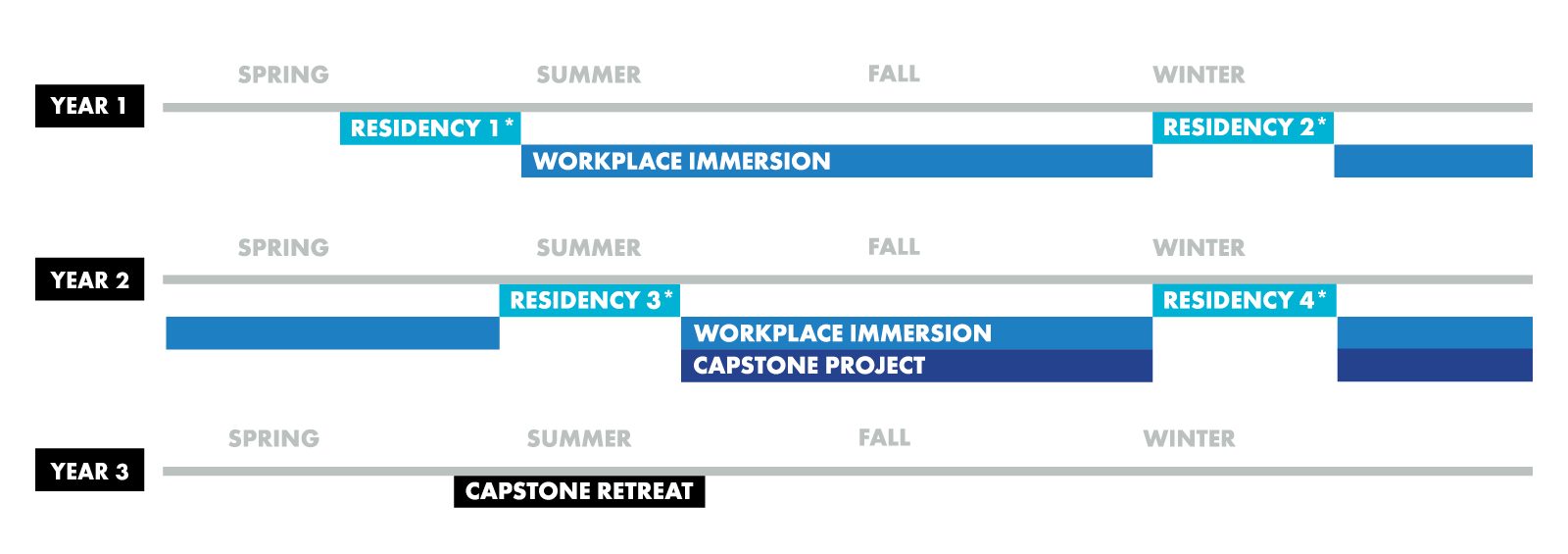Master of Arts in Leadership, Theology & Society

Introduction
In MALTS, you'll be equipped through a learning experience that is:
- Transformative: Cultivate a practice of ethical leadership driven by a vision of human dignity, the flourishing of creation, and the common good.
- Thoughtful: Build critical awareness of the ways in which culture, theology, and the biblical narrative inform effective leadership.
- Practical: Hone essential leadership skills such as making difficult decisions, managing groups, managing conflict, and mentoring.
- Unique: Experience an innovative, cohort-based learning model combining intensive on-campus classes with Workplace Integration, one-on-one mentorship, and a Capstone Project tailored to your vocation.
- Flexible: Learn in intensive two-week segments; substantially enhance your leadership competence without leaving your career.
Students who pursue this degree typically...
- Are interested in leading creatively, thoughtfully, and redemptively in their vocational sphere.
- Are working professionals considering an executive leadership program.
- Are seeking to understand how they can serve the common good as they continue serving their organization.
- Enjoy learning alongside other students with a wide range of backgrounds, cultures, ages, and leadership experience.
Program Structure
| Credit Hours | Completion Time | Costs |
|---|---|---|
| 36 |
25 months (begins in May, finishes in June)
|
Total tuition: $29,000 |
*This amount covers all courses, as well as the cost of the Capstone Retreat (including accommodation and meals).
Format
MALTS is a low-residency program.
- Courses are delivered during four intensive, two-week residency periods at Regent College.
- Course assignments, mentorship meetings, webinars, and other requirements are completed from home.
- The program ends with a one-week, in-person Capstone Retreat in British Columbia.
Program Timeline
The program takes 25 months across three calendar years, starting in May and ending in June. Individual residencies take place in May of the first calendar year, January and July of the second calendar year, and January and June of the third calendar year. A new cohort will start in May each year.

Dates: 2026 Incoming Cohort
|
RESIDENCY 1 |
RESIDENCY 2 |
RESIDENCY 3 |
RESIDENCY 4 |
|---|---|---|---|
| Old Testament Foundations Matthew Lynch |
Christian Theology Jeff Greenman and Abraham Wu |
New Testament Foundations Mariam Kamell Kovalishyn |
Models of Public Engagement Iwan Russell-Jones and Amanda Russell-Jones |
| Leadership, Theology & Society Jeff Greenman and David Robinson |
Theology & Spirituality of Work Katherine Alsdorf and Alvin Ung |
The Effective Leader Peter Shaw |
The Wise Leader Alec Hill and Uli Chi |
Capstone Retreat
June/July 2028
Program Requirements
The MALTS program is designed to enable participants to remain in their current workplace while developing their leadership abilities. Its cohort-based design provides important opportunities for students and faculty to build relationships within the context of courses, meals, and online meetings. All students are accordingly required to participate fully in every aspect of the program, including:
- Eight on-campus courses, delivered through four intensive two-week residences at Regent College in Vancouver.
- A two-year Workplace Integration, during which you will be paired with a dedicated mentor who will help you reflect on and discuss how your MALTS coursework applies within the context of your workplace and your development as a leader. You will also participate in five webinars per year related to various aspects of leadership.
- A Capstone Project, in which you will apply your learning from the program to a situation in your own workplace. This cumulative assignment will give you the opportunity to blend theological reflection with creative expression as you develop a project in a format suited to your particular workplace (e.g., a curriculum, business plan, policy paper, healthcare protocol, etc.).
- A week-long Capstone Retreat, where you will gather to share your Capstone Project and celebrate the conclusion of the program.
Courses & Credits
MALTS students complete eight specific courses in a set order during their campus residencies. These courses, most of which are unique to the MALTS program, build on one another to broaden and deepen your perspective on the theology, ethics, and practice of leadership. Once you enroll in the program, you'll be automatically registered for all required courses.
Your Workplace Integration and Capstone Project will be completed largely between residencies. You will present your Capstone Project to your cohort and faculty members during the final Capstone Retreat.
| Course | Credit Hours |
|---|---|
| Old Testament Foundations (BIBL 501) | 3 |
| New Testament Foundations (BIBL 502) | 3 |
| Leadership, Theology, and Society (INDS 615) | 3 |
| Theology and Spirituality of Work (INDS 632) | 3 |
| Christian Theology (THEO 625) | 3 |
| The Effective Leader (APPL 618) | 3 |
| Models of Public Engagement (HIST 607) | 3 |
| The Wise Leader (INDS 618) | 3 |
| Workplace Integration: Year 1 (APPL 685) | 3 |
| Workplace Integration: Year 2 (APPL 686) | 3 |
| Capstone Project (APPL 785) | 6 |
| Total | 36 |
Foundational Core Courses
Additional Requirements
Participation in the MALTS program is a significant time commitment, both during and between residencies.
- Each residency in Vancouver is an intensive learning experience. Plan to spend 6 hours a day in class and additional time participating in discussions over meals.
- You will be expected to engage with ongoing coursework not only while you are on campus but throughout the program. Estimated workload between residencies is about 7–10 hours per week (readings, written assignments, etc.).
- Because the length of time between residencies varies, your coursework will not be evenly distributed throughout the program. The shortest gap between residencies is five months, which means you'll need to spend about 10 hours per week. The longest gap is seven months, so you'll need to do about 7 hours a week.
Planning Time Away from Work
MALTS is a low-residency program, requiring your on-campus presence for only two weeks at a time. To attend your residencies, you should plan to take the following time away from your workplace:
- 2 weeks in May of the first calendar year of your program.
- 2 weeks in January and 2 weeks in May/June of the second calendar year.
- 2 weeks in January and 1 week in June of the third calendar year.
Mentorship and Cohort Community
The MALTS program offers many opportunities to develop rich relationships.
- You will be provided with a mentor who will accompany you throughout your MALTS journey. You will meet with your mentor every 4 to 6 weeks, either in person or via phone/Zoom call.
- MALTS cohorts have historically developed a deep sense of cohesion and community. Students report that one of their favourite parts of the program is the opportunity to learn with and from classmates who hold leadership roles in a wide range of organizations from around the world.
Plan to spend time working, thinking, sharing, and enjoying yourself with other members of the MALTS community throughout your program.
Notes on the Requirements
There are no elective courses in the MALTS program; students are expected to take the required courses in sequence with their cohort. Transfer credit or exemptions are available only in specific cases:
- Students who have taken Old Testament Foundations (BIBL 501) and/or New Testament Foundations (BIBL 502) at Regent College within seven years of beginning the MALTS program may substitute another course in place of the course(s) they have already taken. They can take their substitute course(s) for either credit or audit.
- Students who have taken a course equivalent to BIBL 501 and/or BIBL 502 at an accredited, graduate-level institution within seven years of beginning the MALTS program must still take BIBL 501 and BIBL 502, but have the option of taking the relevant course(s) for audit.
Attendance and participation are still required in courses taken for audit, and students who choose to take BIBL 501 and/or BIBL 502 for audit will still pay the full cost of the MALTS program.
All other students must take all of the MALTS courses as prescribed. No exemptions will be granted on the basis of undergraduate courses.
Note: If you miss or fail two or more courses in the MALTS program—for example, if you are unable to attend one of the residencies—you will be removed from your current cohort and will need to apply for admission to another cohort at a later time. If readmitted, you will re-enter the program at the time corresponding to the missed or failed courses.
Featured Faculty
Admission Requirements
Academic Requirements
Your application needs to demonstrate that your background and experiences have prepared you to succeed in graduate-level studies. This usually means that you have completed a bachelor's degree a grade point average of at least 2.8 out of 4.0 (or equivalent).
If you do not have a bachelor's degree but are at least 28 years old, you can apply as a mature student. You'll be asked to explain how your life, work, ministry, and/or educational experience can be seen as equivalent to a university degree.
Contact the Admissions team or see our Admission Requirements page to learn more.
Professional Requirements
Admission to the MALTS program also requires five years of full-time work experience (or equivalent), either in a leadership position or actively and evidently working toward a leadership position. You are expected to be currently employed (whether in a paid or volunteer capacity) in order to access a workplace in which to fulfill the requirements for the Workplace Integration and Capstone Project.
If you are not currently employed but you feel that the MALTS program is the right next step for you, please contact us and we will be happy to discuss your situation.
Application Timeline
The MALTS program begins in May, so application deadlines are earlier than those for other Regent programs. We recommend that all applicants submit their completed applications as early as possible to allow sufficient time for processing, interviews, and preparation for the first residency.
International applicants, who require a study permit, are encouraged to apply well in advance to allow adequate time for permit processing.
| Region | Recommended Deadline |
| International | December 10 |
| Canada | February 6 |
Applications are reviewed in the order they are received. The application process includes an interview, which will be scheduled once the application is complete. The MALTS program has a limited number of spots available each year. Once the cohort reaches capacity, qualified applicants will be placed on a waitlist.
Commitment Installment
After you have been admitted to the program, you will have one month to submit a commitment form with a non-refundable installment of $1,000 CAD toward the program's tuition. This payment secures your place in the upcoming MALTS cohort. Note that this deposit will be forfeited if you decide not to join the program after making a commitment. If, due to unforeseen circumstances, you need to defer the start of your program to the following year, your commitment installment will be carried forward and you will not need to pay it again.
Preparing for Your Program
MALTS students should expect to do the following throughout the program.
- Arrange and pay for travel to and from Vancouver for your residencies and to and from the location of the Capstone Retreat.
- Arrange accommodation, meals, and local travel (via public transit, rental car or carshare, taxi or rideshare, etc.) during your residencies.
You may find the information in the Life in Vancouver section of this website helpful as you plan for your on-campus residencies.